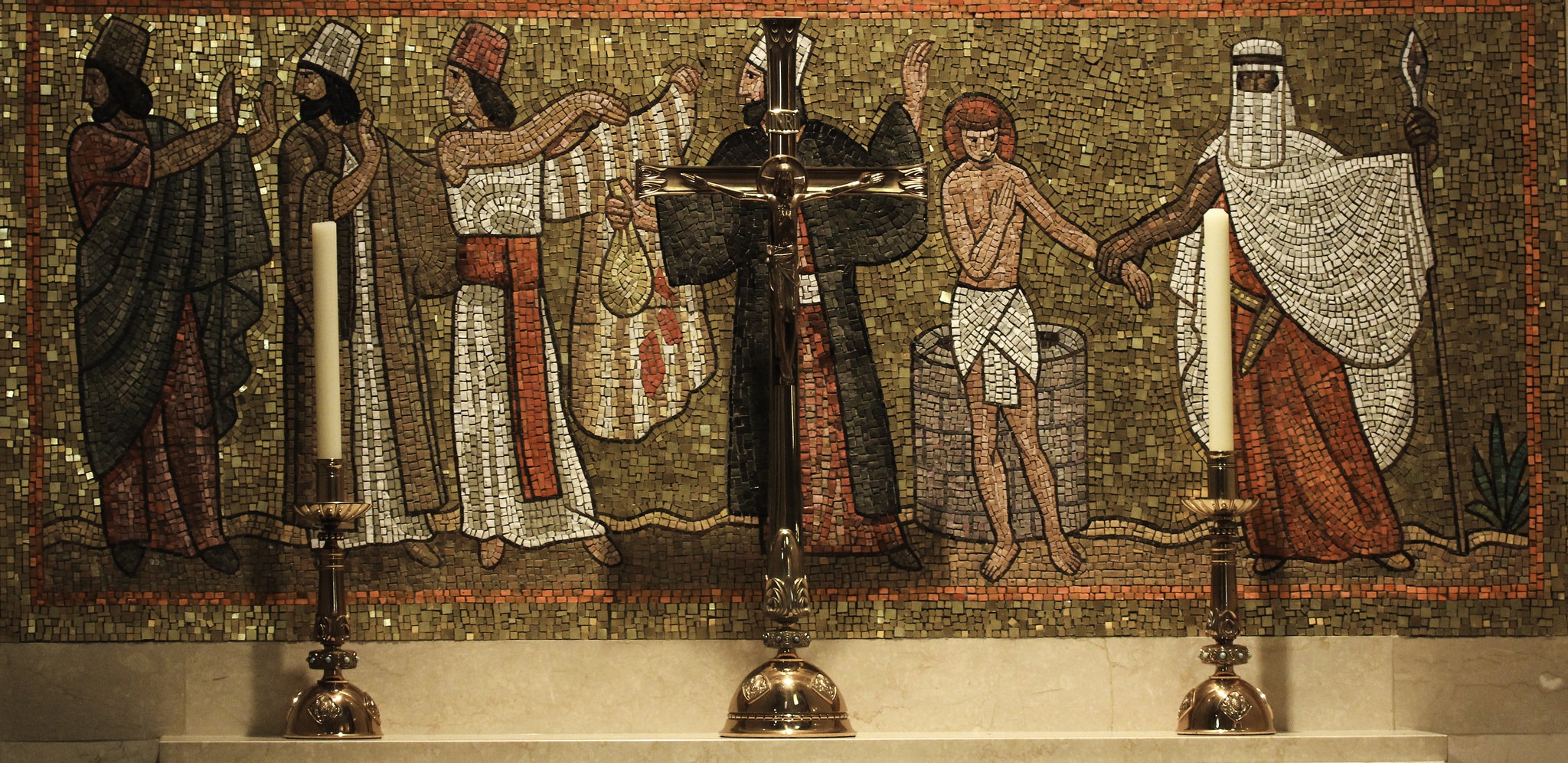Welcome to En-Gedi…
 Featured Article: (from Parables and Stories)
Featured Article: (from Parables and Stories)
God’s Wounded Family
by Lois Tverberg
When Joseph’s brothers saw that their father was dead, they said, “What if Joseph bears a grudge against us and pays us back in full for all the wrong which we did to him!”
So they sent a message to Joseph, saying, “Your father charged before he died, saying, `Thus you shall say to Joseph, “Please forgive, I beg you, the transgression of your brothers and their sin, for they did you wrong.”‘ And now, please forgive the transgression of the servants of the God of your father.” And Joseph wept when they spoke to him.
But Joseph said to them, “Do not be afraid, for am I in God’s place? “As for you, you meant evil against me, but God meant it for good in order to bring about this present result, to preserve many people alive.” So therefore, do not be afraid; I will provide for you and your little ones.” So he comforted them and spoke kindly to them.
– Genesis 50:15-17,19-21
Many people feel that brokenness in their background prevents God from using them for his greatest purposes. Yet, as we look at Jacob’s family, even though deep woundedness followed them much their lives, God worked to heal them. But we also see that the process can be long and slow.
The difficulties began back when Jacob was forced to marry Leah, the sister of the woman he loved, Rachel. Leah bore son after son for Jacob, each time hoping that finally, Jacob would love her as he did her sister. But he never did. This was evident many years later when the brothers asked Jacob to let Benjamin come with them to Egypt. He said, “My son shall not go down with you; for his brother is dead, and he alone is left!” (Gen. 42:38) The statement hints that he considered Benjamin his only “real” son, the only one left he really cared about. Jacob’s favoritism for Rachel and her children had left deep scars on his other sons.
The unloved brothers’ woundedness was what caused them to nearly to murder Joseph, and many years later when they come to Egypt, they were still plagued by guilt for their cruelty toward him. When we read that Joseph made himself known and invited them down to Egypt, we think that we’ve reached the “happy ending” that all good Christian stories ought to have! But, the final verses in Genesis reveal that the issues in this dysfunctional family lingered for years after that. After their father died, the brothers returned to the worry that Joseph was still plotting to repay them for their crime against him. At that point Joseph wept one more time. Was it because he had thought that his family wounds had been mended and he saw that they still had not been?
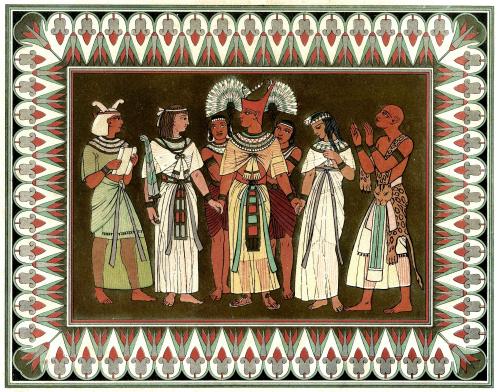 When we see that this family who was to bless all the families of the earth is very average in terms of its pain, we can take hope that God truly can use anybody. God worked through their sinfulness to accomplish his purposes, but he isn’t a God of magical, quick fixes. After a great act of redemption in their lives (moving them to Egypt to be saved from the famine) their problems weren’t over, but he was gently working to bring them back together as a family. This is the note on which their story ends.
When we see that this family who was to bless all the families of the earth is very average in terms of its pain, we can take hope that God truly can use anybody. God worked through their sinfulness to accomplish his purposes, but he isn’t a God of magical, quick fixes. After a great act of redemption in their lives (moving them to Egypt to be saved from the famine) their problems weren’t over, but he was gently working to bring them back together as a family. This is the note on which their story ends.
Photo: Lawrence OP and Owen Jones
The Testing of the Family
by Lois Tverberg
Then they said to one another, “Truly we are guilty concerning our brother, because we saw the distress of his soul when he pleaded with us, yet we would not listen; therefore this distress has come upon us. Now comes the reckoning for his blood.” They did not know, however, that Joseph understood, for there was an interpreter between them. He turned away from them and wept. – Genesis 42:21, 23-24
The final scenes in Joseph’s story, when his brothers come to Egypt, are very dramatic but somewhat of a puzzle. Why does he put them through so much torment and interrogate them as he does?
As we read the final story, it helps to remember that Rachel’s sons (Joseph and Benjamin) had a very cold relationship with the rest of the family because of Jacob’s favoritism. Joseph was very close to his brother Benjamin, but was convinced that his other brothers were liars and potential murderers for what they had done to him. When they came into his courts, he certainly would have been scanning their group for the face of Benjamin, but when he was missing, he probably worried that his brothers might have killed him because he was their father’s other favorite son. He devised a plan to force them to bring Benjamin to him, to see him and perhaps to protect him from their violence.
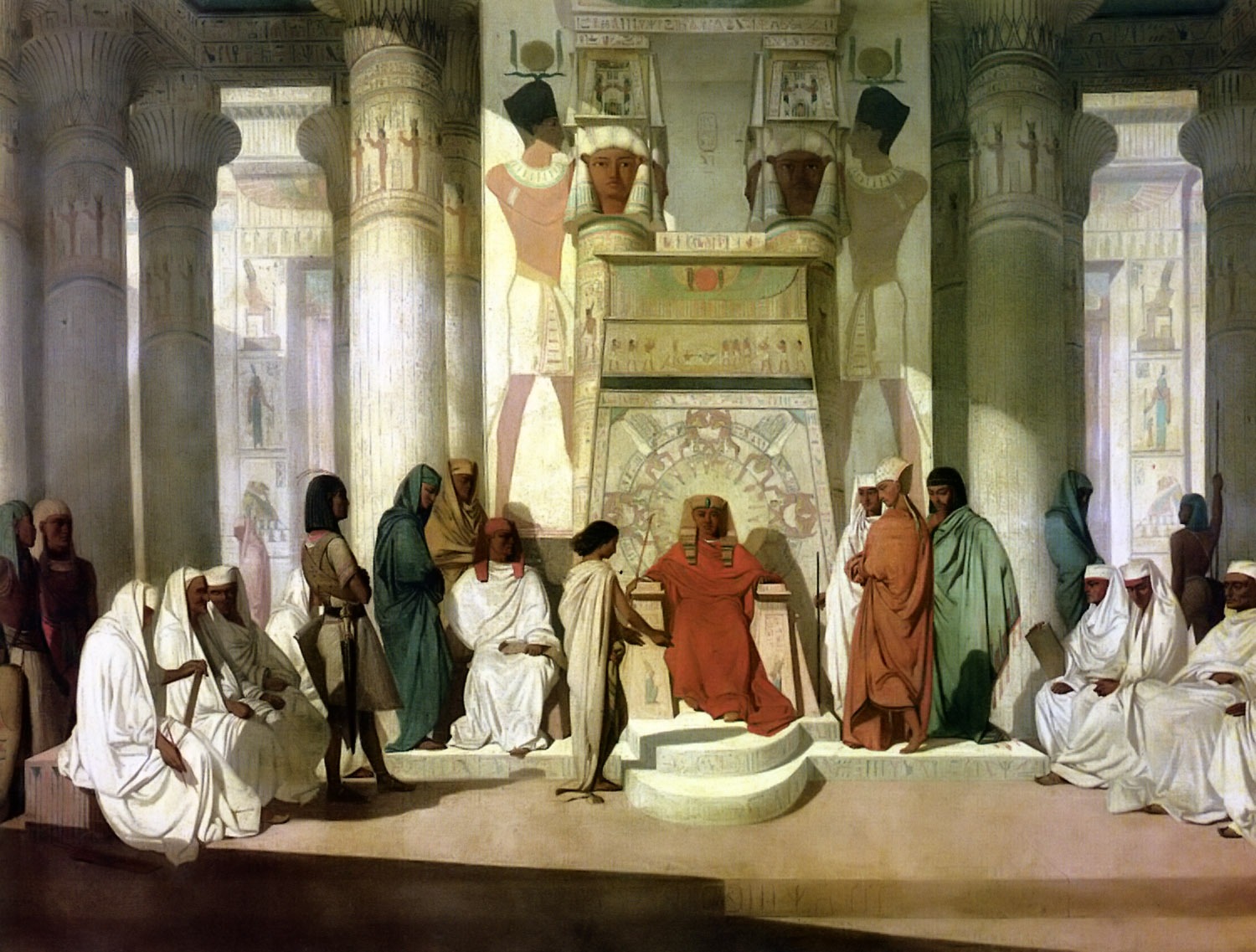 Joseph was also forcing his brothers to live through some of what he went through, to see how they would respond. Just as they put him in a cistern, he put them in a dungeon (the same word is used for both). By returning their silver in their sacks, it appears that he was reminding them that they had sold him for silver long ago. And, by imprisoning Simeon, the brothers were forced to see their father Jacob go through anguish yet again at the loss of a son in their company.
Joseph was also forcing his brothers to live through some of what he went through, to see how they would respond. Just as they put him in a cistern, he put them in a dungeon (the same word is used for both). By returning their silver in their sacks, it appears that he was reminding them that they had sold him for silver long ago. And, by imprisoning Simeon, the brothers were forced to see their father Jacob go through anguish yet again at the loss of a son in their company.
Finally, when Benjamin came with them, he treated him with favoritism to arouse their envy, and then put them to the ultimate test: when his cup was found in Benjamin’s sack, would they leave him as a slave as they did Joseph many years before? He must have thought that their jealous dislike for their half-brother would make it an easy choice.
Through this time of testing of the brothers, the brothers went through much anguish, believing that these troubles had fallen upon them because of what they did to Joseph. But, this process of soul-searching caused them to repent and change. For the sake of Benjamin, they all returned to plead for his release, showing that they considered him their brother, worthy of risking their lives for sake. And Judah, whose idea it was to sell Joseph into slavery, showed his complete repentance when he offered himself in the place of Benjamin as slave.
The family had finally come together – they would not abandon Benjamin as they did Joseph, as they did before. This was finally what brought healing, and they would never be the same again.
Photo: http://freechristimages.org
Wisdom for Good Years
by Lois Tverberg
Behold, seven years of great abundance are coming in all the land of Egypt; and after them seven years of famine will come, and all the abundance will be forgotten in the land of Egypt, and the famine will ravage the land. Let Pharaoh exact a fifth of the produce of the land of Egypt in the seven years of abundance. Let the food become as a reserve for the land for the seven years of famine which will occur in the land of Egypt, so that the land will not perish during the famine.
– Genesis 41:29-30, 34, 36
When God told Pharaoh through his dreams that there would be seven years of record crops followed by seven years of famine, he was giving him an enormous gift of insight into the future. With that warning, he was able to save the lives of his countrymen, as well as those in the surrounding region.
 In the past few years, many of us wished that God would have given us Pharoah’s dreams of warning about the future. In the late 1990’s the U.S. experienced a business boom and record stock highs, but since 2001, especially after September 11, we have experienced a severe recession that still is with us. Many of us lost retirement savings in the stock market, or lost a job or had a businesses fail. Wouldn’t it have been wonderful if God would have warned us ahead of time? We can see the great wisdom that Joseph gave Pharoah about saving from the coming abundance for times of hardship. In these past years, many of us have re-learned this lesson, and now make our decisions with money based on an assumption that times may change for the worse.
In the past few years, many of us wished that God would have given us Pharoah’s dreams of warning about the future. In the late 1990’s the U.S. experienced a business boom and record stock highs, but since 2001, especially after September 11, we have experienced a severe recession that still is with us. Many of us lost retirement savings in the stock market, or lost a job or had a businesses fail. Wouldn’t it have been wonderful if God would have warned us ahead of time? We can see the great wisdom that Joseph gave Pharoah about saving from the coming abundance for times of hardship. In these past years, many of us have re-learned this lesson, and now make our decisions with money based on an assumption that times may change for the worse.
 While most know the truth of this economically, we should also think about this idea of “storing up a harvest” in times of abundance in other ways. We also should consider our relationships and our faith in God. Do we realize that our children will grow up and leave home, our friends may move away, and our parents will die someday? Do we know that it is almost inevitable that we will go through times of discouragement and a struggle for faith?
While most know the truth of this economically, we should also think about this idea of “storing up a harvest” in times of abundance in other ways. We also should consider our relationships and our faith in God. Do we realize that our children will grow up and leave home, our friends may move away, and our parents will die someday? Do we know that it is almost inevitable that we will go through times of discouragement and a struggle for faith?
When we think ahead toward these potential hard times, it reminds us not to neglect to “store up” what we will need to be sustained when the need doesn’t seem so pressing. We need to grow relationships in our family and friends that can weather both good times and bad. And we need to grow our roots of faith in God deep enough so that they can sustain us in dry times too. Soon or later the dry times will come, and it is only what we have stored up that will sustain us then.
Photo: Pushkarv and Stephen Morrison/AusAID
At Peace in Prison
by Lois Tverberg
When a man’s ways are pleasing to the LORD, He makes even his enemies to be at peace with him.
– Proverbs 16:7
After Joseph was falsely accused by Potiphar’s wife and was sent to prison, the scriptures report that “the LORD was with Joseph and extended kindness to him, and gave him favor in the sight of the chief jailer (Gen 39:21).” As a result, Joseph was put in charge of the other prisoners and trusted entirely with the job. It is remarkable that in such terrible circumstances, Joseph could make such a positive impression on his captors. His jailor could have been his tormentor, but instead he treated him like a friend. Joseph must have had an extraordinary personality to have had this effect on people.
This story reminded me of another man with a similar experience. Dietrich Bonhoeffer, a German pastor and theologian, was a man of powerful convictions
 and part of the resistance to the Nazis in World War II. He was passionate that Christianity was not just an otherworldly faith, but that it demanded that he live each day according to the words of Jesus. After being arrested for his part in the resistance movement, he was sent to prison, where he spent his last two years before being executed.
and part of the resistance to the Nazis in World War II. He was passionate that Christianity was not just an otherworldly faith, but that it demanded that he live each day according to the words of Jesus. After being arrested for his part in the resistance movement, he was sent to prison, where he spent his last two years before being executed.
Interestingly, Bonhoeffer had the same effect on the prison guards as Joseph had on his jailor. His warm, Christ-like spirit impressed his guards and greatly endeared him to them. As a result, they allowed him to visit the cells of other despairing prisoners to counsel them. He even ministered to the guards themselves! Because of their sympathy for him, the guards smuggled much of his writing out of prison, leaving a legacy for us today.
Why was it that Bonhoeffer had such a powerful effect on those around him? In Joseph’s case, the Bible says that “the LORD was with Joseph and extended kindness to him.” It seems to be the case with Bonhoeffer as well — he had become intimately close to God, and the Lord was “with him” too. The powerful love of God love shone through him to others, and they responded in kind. In the cases of both of these men, God’s love radiating through them caused even their enemies to be at peace with them.
Photo: http://www.abcgallery.com/
Exceptional Character
by Bruce Okkema
As much as she coaxed Joseph day after day, he did not yield … Genesis 39:10 JPS
Joseph will be a powerful figure in biblical history if he lives true to the drama that accompanies his introduction in Genesis 37. The story teller begins by emphasizing this young man’s part in a polygamous family in which there is much tension, and we read of his unfavorable report about his brothers to his father. Soon our hearts go out to him as he is mercilessly thrown into a pit and sold into slavery by his brothers. One comes back to rescue him and finds him gone, then his brothers lie about what they have done, even reporting to Jacob that his favored son has been killed. But what happens next in chapter 39 is almost unbelievable, especially for men.
We read,
The Lord was with Joseph and he prospered, and he lived in the house of his Egyptian master. When his master saw that the Lord was with him and that the Lord gave him success in everything he did, Joseph found favor in this eyes and became his attendant. Potiphar put him in charge of his household, and he entrusted to his care everything he owned … now Joseph was well-built and handsome … and after a while his master’s wife … said … ‘Come to bed with me’ … day after day. (Gen. 39:2-10).
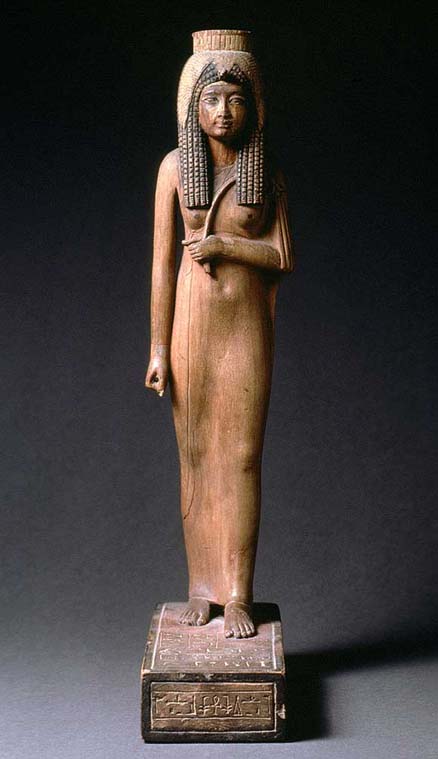 A glance at artwork from that time period in Egypt will reveal that royal women were not known for their modesty. And knowing the power of lust, you might be able to imagine how Potiphar’s wife may have been dressed as she whispered, “come to bed with me, I desire you, we are alone, nobody will know …” Aside from his own natural desires, Joseph would have known that slaves were commonly used for sexual pleasure, and his master’s wife was issuing him a command! Any adult will instantly understand the intensity of this temptation and the ease with which a young man could have succumbed.
A glance at artwork from that time period in Egypt will reveal that royal women were not known for their modesty. And knowing the power of lust, you might be able to imagine how Potiphar’s wife may have been dressed as she whispered, “come to bed with me, I desire you, we are alone, nobody will know …” Aside from his own natural desires, Joseph would have known that slaves were commonly used for sexual pleasure, and his master’s wife was issuing him a command! Any adult will instantly understand the intensity of this temptation and the ease with which a young man could have succumbed.
But he refused. “With me in charge,” he told her, “my master does not concern himself with anything in the house; everything he owns he has entrusted to my care. No one is greater in this house than I am. My master has withheld nothing from me except you, because you are his wife. How then could I do such a wicked thing and sin against God?” (Gen. 39:8-9)
Then the story continues to build until she physically grabs him and he runs from her, leaving his cloak in her hands.
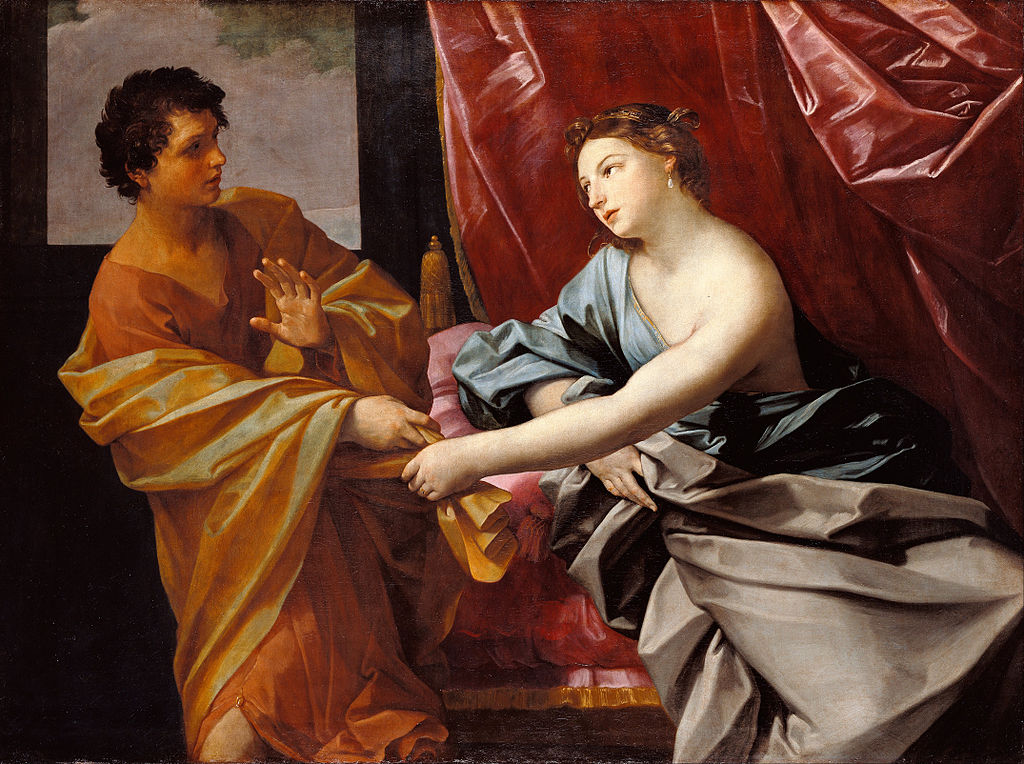 There is a lot to this story that we are not told, but reading between the lines, it is likely that Potiphar did not totally believe his wife’s account. She had softened the accusation of attempted rape which she had made to the other servants, to one of “making sport of me” when she told her husband. Also, Joseph may have had a chance to tell his side of the story even though it is not recorded. Neither is his reaction recorded in the account of his brothers throwing him into the pit (Gen. 37), yet later, in their retelling of that story (Gen. 42:21), we read, “he pleaded with us.” Potiphar could have certainly executed Joseph, which would have been the normal punishment for such crimes, but rather he had him imprisoned. And he knew Joseph’s character, having trusted him so much as to put him in charge of his entire estate. His wife’s character, as evidenced by her behavior, was questionable.
There is a lot to this story that we are not told, but reading between the lines, it is likely that Potiphar did not totally believe his wife’s account. She had softened the accusation of attempted rape which she had made to the other servants, to one of “making sport of me” when she told her husband. Also, Joseph may have had a chance to tell his side of the story even though it is not recorded. Neither is his reaction recorded in the account of his brothers throwing him into the pit (Gen. 37), yet later, in their retelling of that story (Gen. 42:21), we read, “he pleaded with us.” Potiphar could have certainly executed Joseph, which would have been the normal punishment for such crimes, but rather he had him imprisoned. And he knew Joseph’s character, having trusted him so much as to put him in charge of his entire estate. His wife’s character, as evidenced by her behavior, was questionable.
Hopefully, we will not find ourselves in such an irresistible situation as was Joseph, but we don’t have to go very far to see all manner of such temptations or to hear Satan beckoning us. Bless the Lord for giving Joseph the strength to do the right thing and then passing on the story! Be encouraged that when we look up, God will do the same for us.
Photo: www.africamaat.com and VwGevEwX5KoxpA at Google Cultural Institute
Tamar, the Heroine
by Lois Tverberg
It was while she was being brought out that she sent to her father-in-law, saying, “I am with child by the man to whom these things belong.” …Judah recognized them, and said, “She is more righteous than I, inasmuch as I did not give her to my son Shelah. – Genesis 38:25-26
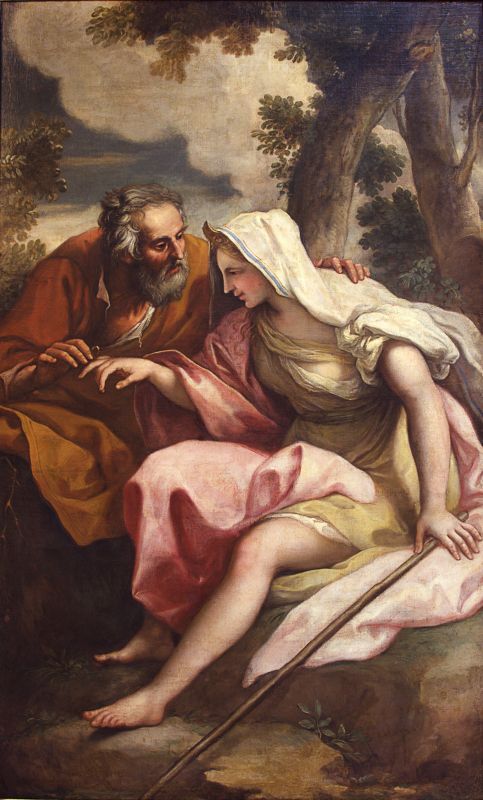 One of the most difficult stories in the Bible is that of Tamar and Judah in Genesis 38. It shocks our modern ears to hear about a woman pretending to be a prostitute and sleeping with her father-in-law, and when she was found pregnant with Judah as the father, she was vindicated as righteous. What in the world is going on here? This story shows that it is critical to understand the culture to get the Bible’s message.
One of the most difficult stories in the Bible is that of Tamar and Judah in Genesis 38. It shocks our modern ears to hear about a woman pretending to be a prostitute and sleeping with her father-in-law, and when she was found pregnant with Judah as the father, she was vindicated as righteous. What in the world is going on here? This story shows that it is critical to understand the culture to get the Bible’s message.
A common law in many ancient cultures was the law of “levirate marriage.” If a woman married and her husband died before having a son, the husband’s family was obligated to give her another husband to have a son as an heir, because to die without one was a terrible curse. To keep the heir in the family, one of the man’s brothers usually was chosen, but even the father-in-law could fill the role according to some ancient documents.
So when Tamar’s husband Er, Judah’s firstborn son died, the family was obligated to help her have a child. The younger son, Onan, deliberately avoided getting her pregnant because the son would inherit Er’s estate, but if she died childless, Onan would get it. His greed infuriated God and he died an early death.
Judah also avoided giving Tamar his other son as a husband, possibly thinking that Tamar was “unlucky” after his first two sons died. By ignoring his obligation to her, he was committing a great sin against her by forcing her into childless widowhood, because she couldn’t marry anyone else. He also was endangering his own tribe, because if his last son died without an heir, they would be wiped out.
Tamar was in a terrible situation, and in the moral understanding of the ancient writer, she found an honorable solution to her desperate need. When she tricked Judah into fathering a child with her, she was choosing not to abandon the family of Judah, but to force Judah himself be her levirate husband, which would have been acceptable in that time. If Tamar had given up instead and Judah’s clan didn’t have an heir, the messianic line would have ended. But because of Tamar’s chutzpah, she entered the line that would lead to the birth of the Messiah. She was considered a heroine for her daring ploy that answered her need as well as the tribe of Judah’s.
As we read, we need to remember to respect the morals of the time and have patience that God is still teaching people how to obey him. It was still hundreds of years before the Torah was given, and thousands of years before Christ. We can admire Tamar’s perseverance in a moral world very different than our own.
Photo: http://www.ng-slo.si/si/razstave/razstava/umetnine-iz-prekmurja?id=1455
Joseph’s Dreams
by Lois Tverberg
Then Joseph told his brothers. ‘Listen,’ he said, ‘I had another dream, and this time the sun and moon and eleven stars were bowing down to me.’ When he told his father as well as his brothers, his father rebuked him and said, ‘What is this dream you had? Will your mother and I and your brothers actually come and bow down to the ground before you? – Genesis 37:9-11
God spoke audibly to Abraham, Isaac and Jacob, but in Joseph’s life, God never spoke aloud, but instead communicated through dreams. The first time was when Joseph was 17 and he dreamed two times that he would rule over his family.
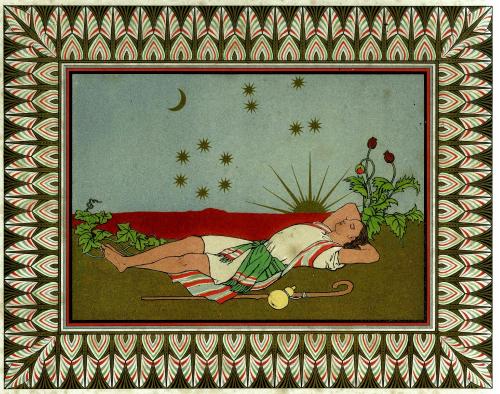
The dreams were probably initially interpreted as Joseph’s belief that he should be the favored “first born” son of the family, who would have been given authority over the family after the father’s death. Of course, the older brothers were jealous and enraged. His second dream was that he would even reign over his parents, which went beyond the idea that he would just receive the blessing from his father, but that he would become a national leader. His brothers were furious.
It surprises us to read that as soon as Joseph had 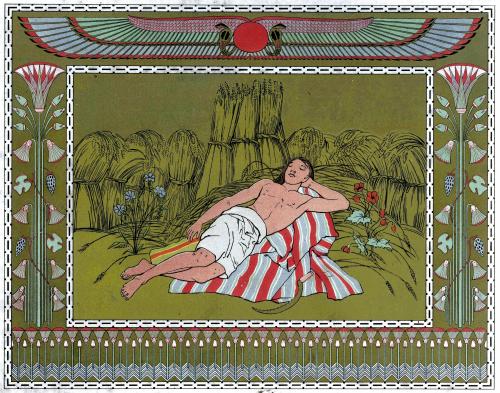 the two dreams, he told his brothers, which caused their extreme anger, which led to his later imprisonment and suffering. Why would he do such a thing, knowing how angry they would get? Some think that Joseph had been spoiled to the point where he was completely insensitive to how his words would affect others. But others point out that in that day, when a person had a clear vision from God, he was expected to share it with others, no matter how it impacted his own life. Joseph had told Pharaoh later when he had two dreams with the same message that “the matter had been firmly decided by God, and God would do it soon” (Genesis 41:32). If Joseph believed that his own two dreams were sure to happen, he probably felt obligated to tell others.
the two dreams, he told his brothers, which caused their extreme anger, which led to his later imprisonment and suffering. Why would he do such a thing, knowing how angry they would get? Some think that Joseph had been spoiled to the point where he was completely insensitive to how his words would affect others. But others point out that in that day, when a person had a clear vision from God, he was expected to share it with others, no matter how it impacted his own life. Joseph had told Pharaoh later when he had two dreams with the same message that “the matter had been firmly decided by God, and God would do it soon” (Genesis 41:32). If Joseph believed that his own two dreams were sure to happen, he probably felt obligated to tell others.
Joseph’s statement to Pharaoh that when one has two dreams, God would be sure to act on on them soon is loaded with irony. At the time Joseph said those words, he had been living in a dungeon for more than two years, and the two dreams in his own life had gone unfulfilled for 13 years. During that time he had been sold into slavery, sent to prison under false charges, and hadn’t seen his family in years. The fact that Joseph could be so sure of God’s answers after years of waiting is a tremendous testimony to his faith. More importantly, if Joseph had given up on God’s answers to dreams during that time, he wouldn’t have interpreted Pharaoh’s dreams, and he wouldn’t have been given the authority to rule that finally caused the fulfillment of his own dreams!
It was by being obedient in the face of dashed hopes that God was able to cause Joseph’s greatest hopes to come true. In the same way, often it is only when we keep on in faith, persevering without evidence, that God can finally cause miracles in our lives as well.
Photo: Owen Jones
Meeting God on the Way
by Lois Tverberg
Then Jacob awoke from his sleep and said, “Surely the LORD is in this place, and I did not know it.” Genesis 28:16
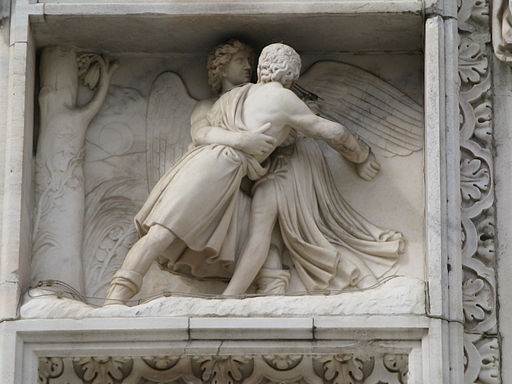 An interesting pattern emerges as we read the stories of Isaac and Jacob carefully. Both of these men had encounters with God, and interestingly, the encounters usually happened when they were traveling into or out of the Promised Land.
An interesting pattern emerges as we read the stories of Isaac and Jacob carefully. Both of these men had encounters with God, and interestingly, the encounters usually happened when they were traveling into or out of the Promised Land.
Isaac never actually left the land, but when a famine came, he headed for Egypt to find food. On his way there, arriving at the southern boundary of Canaan, he had a vision from God. The Lord told Isaac not to leave the land and that he would prosper there. Since God had promised to give this land to Abraham’s descendants, it was symbolic of that promise that his son never left the land and lived his entire life there.
Isaac’s son Jacob, however, did need to leave the land to go and find a wife from among his relatives back in Haran. His first encounter with God came as he was traveling out of Canaan, when he had a vision of a stairway to heaven. God said to him, “Behold, I am with you and will keep you wherever you go, and will bring you back to this land; for I will not leave you until I have done what I have promised you” (Genesis 28:15). His next encounter was as he was going to cross the Jabbok river on his way back into the land (Genesis 32:24). There he wrestled with God, and God gave him a new name, Israel.
The last encounter occurred when his sons brought him down to Egypt to live with his long lost son, Joseph, who was in a position to provide for their family during the famine. When Jacob got to the southern border of Canaan, he had a vision in which God said to him,
I am God, the God of your father; do not be afraid to go down to Egypt, for I will make you a great nation there. I will go down with you to Egypt, and I will also surely bring you up again; and Joseph will close your eyes. (Genesis 46:3-4)
All these encounters show us that God had claimed the land of Canaan as the particular place where he would dwell with his people. The early patriarchs entered it and left it only with his permission and at his direction. Interestingly, the scenario is repeated when the Israelites were about to enter the Promised Land upon their return from Egypt. An angel of the Lord with a drawn sword in his hand stopped Joshua and told him to remove his sandals for the place where he was standing was holy. (Joshua 5:13-15). Once again God had made his presence known as he lead his people into this, his special land.
Photo: Yair Haklai
Following God’s Blessing
by Lois Tverberg
The scepter will not depart from Judah, nor the ruler’s staff from between his feet, until he comes to whom it belongs and the obedience of the nations is his.
– Genesis 49:10
I used to struggle with why we have the stories we do in Genesis – about the sons of Jacob destroying the city of Shechem, or Reuben sleeping with his father’s servant girl. My expectation was that the Bible was a book of simple moral stories to teach me how to live.
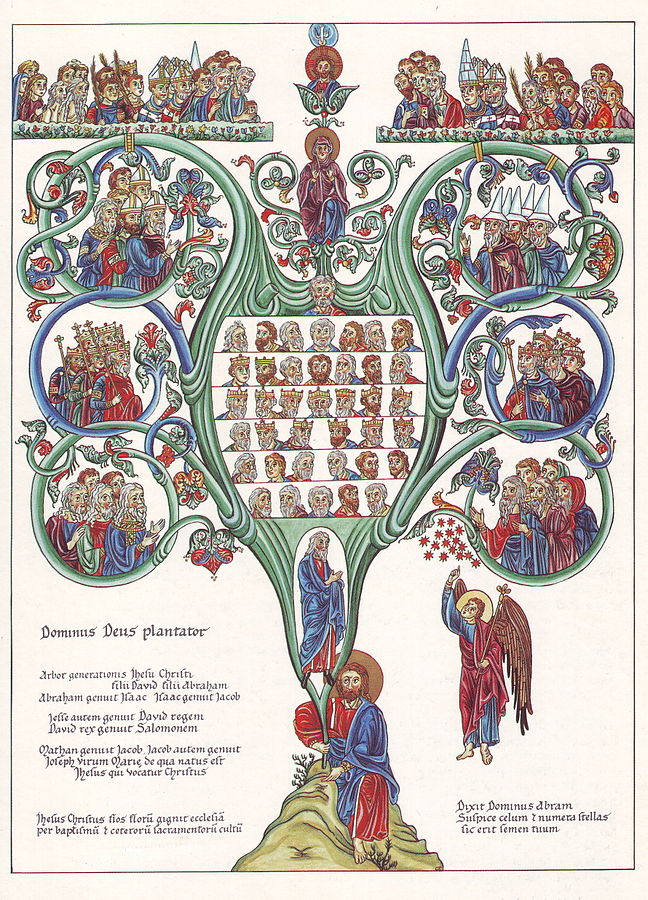
Actually, the Bible has a completely different purpose. It is actually an epic tale about God choosing a family to become his holy nation, through whom he would send one to redeem the whole world. The goal of the stories is to trace God’s blessing throughout the generations, and understand who is chosen to carry it on to the next generation. Of Abraham’s sons, Isaac received it rather than Ishmael. Of Isaac’s sons, Jacob received it rather than Esau. It was God’s choice each time, and it was usually the less likely person that he chose.
Many stories are told about the twelve sons of Jacob, because each would become head of one of the twelve tribes of Israel. Interestingly, once again God made an unlikely choice. The very firstborn of the family was Reuben, but he was disqualified because he dishonored his father by sleeping with Bilhah (Gen 35:22, Gen. 49:3). Simeon and Levi are next in line, but they were both disqualified because they destroyed the city of Shechem (Gen. 34:25, Gen. 49:5-7). That is probably why that ugly story is included.
Jacob had his own idea of who should be heir, and he chose Joseph, the first born son of the wife that he loved. That was the source of jealousy and conflict in the family. It was why Jacob gave Joseph the special coat, and why Joseph’s dreams that his family would bow down to him made his brothers so furious. When Jacob was old he gave Joseph the inheritance of the first-born – a double portion of the estate. He did this by adopting Joseph’s two sons, Ephraim and Manassah as sons of his own, so that they would become two of the tribes of Israel.
Looking ahead into the future, it’s interesting to see which tribe God ultimately chose to carry on the greatest blessing. He used Joseph to save his family, so he blessed him in one sense. But actually, the ultimate blessing went to Judah, the fourth-born son of Leah, the unloved wife, who became the instrument of God’s redemptive plan. He was the one who would ultimately give rise to Christ. Jacob proclaimed it in an obviously messianic passage, “The scepter will not depart from Judah, nor the ruler’s staff from between his feet, until he comes to whom it belongs, and the obedience of the nations is his.” (Genesis 49:10) This was fulfilled when Jesus, the Lion of the tribe of Judah, arrived on earth!
Photo: Herrad von Landsberg
Reaping What You Sow
by Lois Tverberg
So Jacob said to Pharaoh, ‘The years of my sojourning are one hundred and thirty; few and unpleasant have been the years of my life, nor have they attained the years that my fathers lived during the days of their sojourning.’
– Genesis 47:9
Many people struggle with the idea that God would work out his plans to establish a nation through the deceitful actions of Jacob. Jacob used a weak moment to barter his brother Esau’s birthright away from him, and he deceived his father into giving him his brother’s blessing. Did God bless his unethical behavior?
Interestingly, his life story shows that his scheming often came back to haunt him. It is most obvious in one case – he used his father’s blindness to substitute himself for his brother, to steal his blessing; but he also was deceived by “blindness” too when on his wedding night, Leah was substituted for her sister Rachel. This is called “measure for measure” by the rabbis – that because he used blindness to deceive, God let him be deceived in the same way.
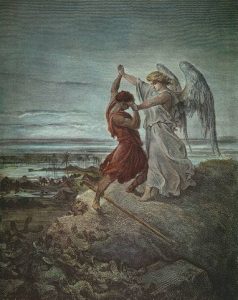 Throughout Jacob’s life, we see that although God is fulfilling his promise to him to give him a family, Jacob does not have the peace that his father and grandfather did. He had to leave his home for fear that his angry brother would kill him and work many years for his crafty uncle. He lost his beloved wife Rachel at a young age and believed that he had lost his favorite son Joseph for many years too. Even Jacob’s suffering over Joseph was brought on by his sons’ terrible jealousy because of his obvious favoritism toward Joseph.
Throughout Jacob’s life, we see that although God is fulfilling his promise to him to give him a family, Jacob does not have the peace that his father and grandfather did. He had to leave his home for fear that his angry brother would kill him and work many years for his crafty uncle. He lost his beloved wife Rachel at a young age and believed that he had lost his favorite son Joseph for many years too. Even Jacob’s suffering over Joseph was brought on by his sons’ terrible jealousy because of his obvious favoritism toward Joseph.
While Abraham “died at a good, ripe age, old and contented” (Gen. 25:8), and Isaac also died at “a ripe old age” (Gen. 35:29), that is not said about Jacob. Instead, Jacob told Pharoah that the years of his life had been “few and unpleasant” (Gen. 47:9). From the time that he deceived his father until the end of his days, his life had been full of trials, many of them brought on himself.
We can learn a lesson through this – that God is faithful and merciful to us who are under his blessing, but he usually refrains from sparing us from the earthly consequences of our sins. We should live wisely knowing that although we are under God’s forgiveness, how we act toward others will have a large impact on the way our lives play out.
*This article was based on an essay in “Understanding Genesis”, by Nahum Sarna, Shocken Books 1966, p. 183.
Photocred: http://www.ibiblio.org/wm/paint/auth/dore/
We’re pleased to be able to share this difficult-to-find classic by Brad Young. Check it out!
The Jewish Background to the Lord’s Prayer
by Brad H. Young
© 1984, Gospel Research Foundation Inc.
Softcover, 46 pages, $8.99
- Explore the Jewish roots of the Lord’s Prayer
- Learn how the Dead Sea Scrolls, rabbinic literature, Jewish prayers, and worship breathe fresh meaning into the revered words of the Lord’s Prayer
- Understand Jesus’ powerful prayer better in the light of Jewish faith and practice
Dr. Brad H. Young (PhD Hebrew University, under David Flusser) is the founder and president of the Gospel Research Foundation in Tulsa, Oklahoma. He is emeritus professor of Biblical Literature in Judaic-Christian Studies in the Graduate School of Theology at Oral Roberts University. Young has taught advanced language and translation courses as well as the Jewish foundations of early Christianity to graduate students for over thirty years.
Check out what else is available from the En-Gedi Resource Center bookstore too…
